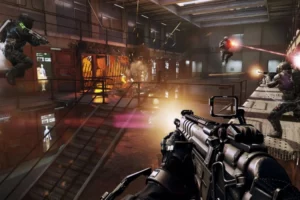The recently released co-op shooter Helldivers 2 has quickly garnered praise for its intense, chaotic, team-focused gameplay. However, as with any multiplayer title, balancing the vast arsenal of weapons and gadgets to create a fair and enjoyable experience for all players is an ongoing challenge. While dominant weapons often get highlighted by players as being overpowered due to racking up excessive kill counts, the developers at Arrowhead Studios have taken a more nuanced approach to balance.
In a recent interview, Arrowhead CEO Johan Pilestedt noted that weapons with the highest kill counts do not actually correlate to higher mission success rates. He states, “Even though the Breaker [shotgun] scores more kills, it is not overrepresented in missions that end in success.” This key insight revealed that balance in Helldivers 2 encompasses more factors than just lethality or kill potential.
The Complexity of Balance in Helldivers 2
Traditionally, weapon balancing in multiplayer shooters focuses almost entirely on evening out kill rates across different guns. If one assault rifle registers a much higher kill count than others, it typically signals the need for developer tuning to bring its power level down. However, Helldivers 2 adds several layers of complexity that make balance far more nuanced.
As a co-op focused game, Helldivers emphasizes completing objectives, supporting teammates, and coordinating crowd control over simply racking up kills. As such, kill count alone fails to tell the whole story. A weapon may excel at defeating enemies, but contribute little towards overall mission success if it lacks utility or synergy with team composition and strategy.
Pilestedt affirms this notion stating, “The secret sauce is not just about damage numbers.” He goes on to highlight several other factors the team considers when balancing weapons:
- Utility – Does the weapon offer additional functionality such as area denial or crowd control?
- Teamwork – Does the weapon facilitate or encourage coordinated teamplay?
- Learning curve – How difficult is the weapon for new players to utilize effectively?
- Situational strength – Does the weapon perform exceptionally well in specific scenarios or against certain enemies?
Taking these elements into account creates balance through diversity – where each weapon fulfills a specific tactical niche. This ensures that different playstyles, team compositions, and strategies have weapons tailored to their needs, rather than having clearly dominant “best” options.

The Hidden Complexity of Secret Stats
Weapon tuning becomes even more complicated with Helldiver’s additional layer of “secret stats” that alter performance. Pilestedt refers to over 40 hidden parameters that affect critical behaviors like recoil, bullet spread, reload speed, or weak point multipliers against enemies. These invisible stats enable the development of unique weapon feel and personality.
However, lack of transparency around these mechanics can also frustrate players who feel left guessing as to why a certain weapon behaves unexpectedly. Secret stats allow granular tuning, but also raise discussions around openness in game design and clear communication with players.
Committed to Data-Driven Balance
While specific details remain unavailable, Pilestedt asserts that Arrowhead Studios is continually reviewing data and feedback to inform upcoming balancing tweaks after the next major patch. Their goal is to strike the right equilibrium where all weapons have strategic value based on capability, coordination, mastery curve and situational context.
Player reception to balance changes is the ultimate test. But Arrowhead’s acknowledgement of the layered intricacies governing weapon effectiveness paired with a data-driven approach signals promising support for establishing long-term balance as Helldivers 2 evolves. Adaptability and nuance seem central to balancing such an intense, cooperative experience.
Striking balance is invariably tricky, but remains crucial for multiplayer game longevity. Arrowhead Studio’s insights provide hope that they are up for the challenge of sustained balance through ongoing patches and adjustments based on data and community feedback.
















Add Comment